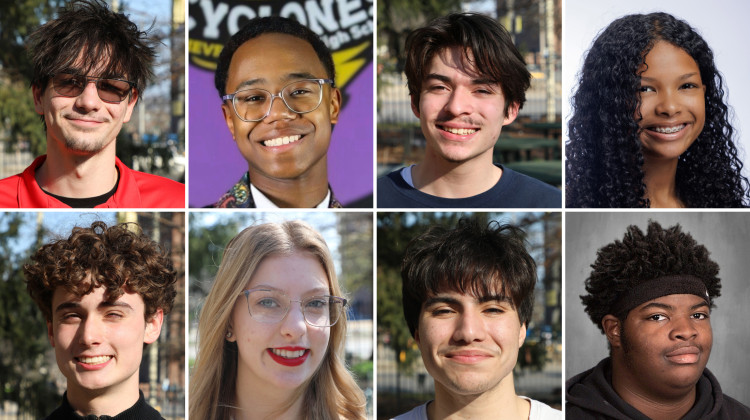
High school students making their voices heard about legislation that would change how schools are funded. Top row, from left: Dale Potter, Javarius Strayhorn, Joseph Salinas, and Rima Baharadine-Bell. Bottom row, from left: Keagan Williams, Rachel Kinnaman, Zakariya 'Zak' Abdulbari, and Ashton King.
Ben Thorp / WFYI; Provided photosIn a funding fight dominated by adult voices and political debates, students from traditional public and charter schools are speaking up — not just about money and resources, but about being seen, heard and respected in disputes about their futures.
Indiana lawmakers may require some school districts to equally share local property tax funds with charter schools for the first time.
The legislation – Senate Bill 518 – has reignited long-standing tensions over school funding fairness, turning into a political clash between parents, educators and advocacy groups.
In Indianapolis, the debate has split school supporters with district officials and charter school advocates taking sides.
Districts say that if they got less property tax revenue their budgets would be unsustainable. Charters say their students should get a cut of property tax money like traditional public schools.
As the rhetoric escalates, the conflict has drawn intense reactions — from protests to fiery testimony to competing op-eds.
But amid the shouting, students say their voices are missing.
Young people have sought opportunities to stand up during the past few months at Statehouse hearings and local school board meetings. Some students crafted what they wanted to say with help, summarizing their passion down to a single page.
WFYI spoke with students advocating for and against the legislation, which is still awaiting a vote in the House Ways and Means Committee. We asked them about who they are and why it’s personal to them. Here is what they said.
Dale Potter
Dale Potter, a senior at Shortridge High School, told lawmakers his education in Indianapolis Public Schools gave him real-world opportunities in architecture. He plans to study that at Miami University in Ohio.
“I would not be able to pursue college and my ambitions if not for these IPS chances,” Potter said.
He testified even though his severe dyslexia makes public speaking difficult, he said. Mostly Potter thought about kids, like his little brother, who could lose so much because of legislation aimed at IPS, he said.
Potter’s younger brother has ADHD and severe dyslexia. He’s on a 504 plan to support his needs at school.
The 18-year-old fears that his little brother’s program would suffer if SB 518 passes because programs for students with disabilities are usually on the chopping block first, he said.
Students should not have to fight for their education – no matter the school, Potter said.
“Instead of pitting charter and public schools against each other and putting students against other students, they should rather think about how they can both help each other,” Potter said. “...ultimately, a student's education comes first, before anything else.”
Following Potter’s impassioned testimony, a Republican lawmaker asked him who signed the Indianapolis 500 hat he was wearing. Potter answered politely.
His friends were furious for him. They said it made him look silly, like a kid.
“I’m going to continue to speak up about it until I truly feel like they’re grasping what it would do to the students,” Potter said. “I don't feel like right now that all these representatives are grasping what it would do to all these students and the lives these students have.”
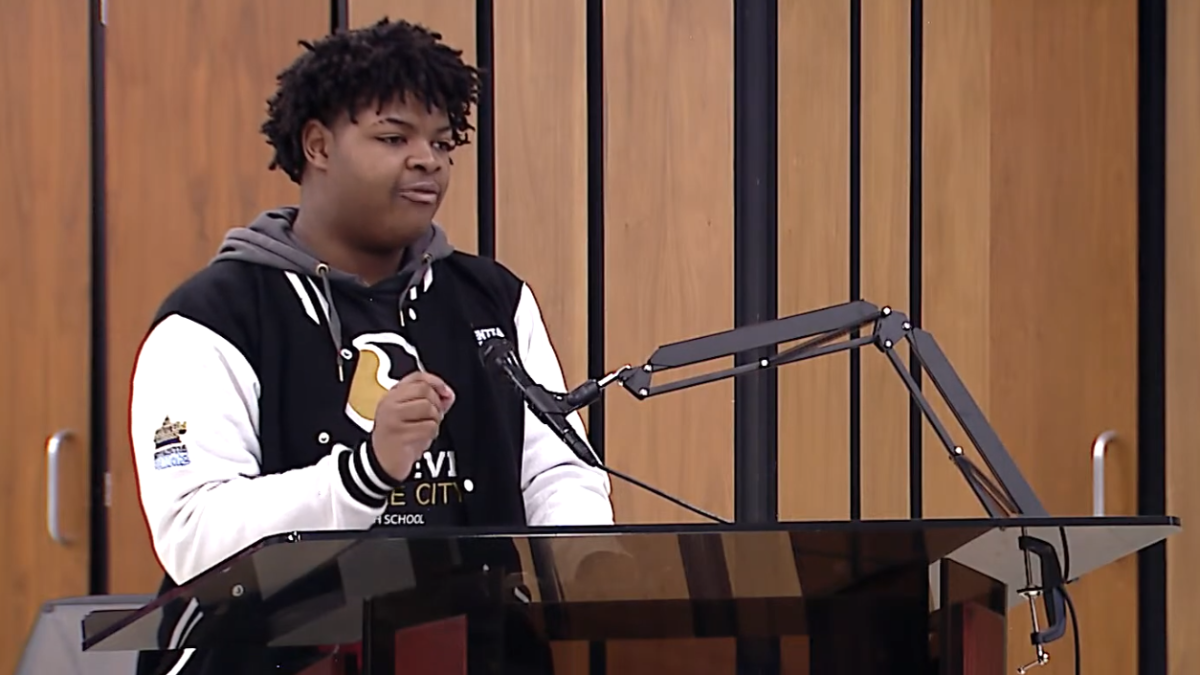
Ashton King
Before going to an Indianapolis charter school, Ashton King said he was struggling in his traditional public school.
“I was not doing great at all,” King said.
King was attending George H. Fisher Elementary School 93, a neighborhood school that families once petitioned for academic changes. Later, the charter operator Phalen Leadership Academies was given control of the school through a partnership with IPS.
“They helped me throughout the summer, gave me books,” King said. “When I hit third grade, I was able to pass the I-READ.”
Now a junior at Believe Circle City High School, King said his teachers support and challenge him.
“They care about each one of their students … give them more standards, because they believe in them and know that they can do it,” King said.
Last month, King spoke during a February meeting of the Indianapolis Public Schools Board to tell them about his education and hopes for more resources at his school. He was nervous.
“The people in the back, they were saying a whole lot and so I got nervous when I got up there, because I just felt uncomfortable,” King said.
King is not giving up on advocacy, but he believes focusing on school will make him a better agent for change in the future.
“I said what I said, I'm going to focus on my next step because I really want to focus on what I'm trying to do … I'll be able to make a bigger change than what I can right now.”
Joseph Salinas
Shortridge senior Joseph Salinas was invited to testify at the Statehouse by his principal, who told him, “We believe you have something to say.”
The issue is personal for the 17-year-old. His mother taught at a charter school for a few years, he said.
When Salinas was younger, he noticed she was often frustrated with her school and students. But he was thriving at his traditional school.
He remembers doing math homework one night. His mom, impressed, recorded it to show her students as a goal.
During his testimony, Salinas said SB 518 would weaken traditional public schools like his own.
He referenced an opinion article from his teacher, Sarah TeKolste, in which she recounts teaching in a charter school.
“The most prominent argument I’ve heard in support of this bill is school choice,” Salinas told lawmakers. “But I have to ask the question, how do you support school choice for a school that doesn’t choose you.”
Despite his disagreement with charter school practices, Salinas said his biggest issue with SB 518 is how it could potentially impact students who need resources from his district, including special education services, or struggle with housing or food insecurity.
“I've been in IPS since second grade, and I wouldn't have that any other way,” Salinas said. “But what pushes me to fight for this topic is how essential IPS is in the services that it provides for students.”
Rima Baharadine-Bell
In December, Rima Baharadine-Bell sat at President Joe Biden’s desk. The opportunity came after years of youth advocacy.
“It was a really cool experience,” Baharadine-Bell said.
The 17-year-old told Biden young people need to be more engaged in civic discussion about education and other issues.
Last month, she traveled three hours from northern Indiana to give testimony at the Statehouse about Senate Bill 518. Her high school principal at Career Academy South Bend had told her about the opportunity. She said there was no question she’d show up.
She arrived in Indianapolis with her teacher and waited nearly 8 hours to tell state lawmakers why her charter education made all the difference in her life.
“If I went to a public school right now, my property tax dollars would follow me,” Baharadine-Bell said. “If I switched to a charter school that was better for my education, better for my future, just offered me more opportunity, that wouldn't follow me.”
Baharadine-Bell had never really heard anything negative about charter schools until testimony on the bill. It was a weird experience to hear one-sided testimony, she said.
She said funding should be fair and that both sides have valid concerns.
“I never thought that I would do much with my life or have much ambition before going to my school,” Baharadine-Bell said. “They opened me up to advocacy and to talking about what I believe in and what really troubles youth today.”
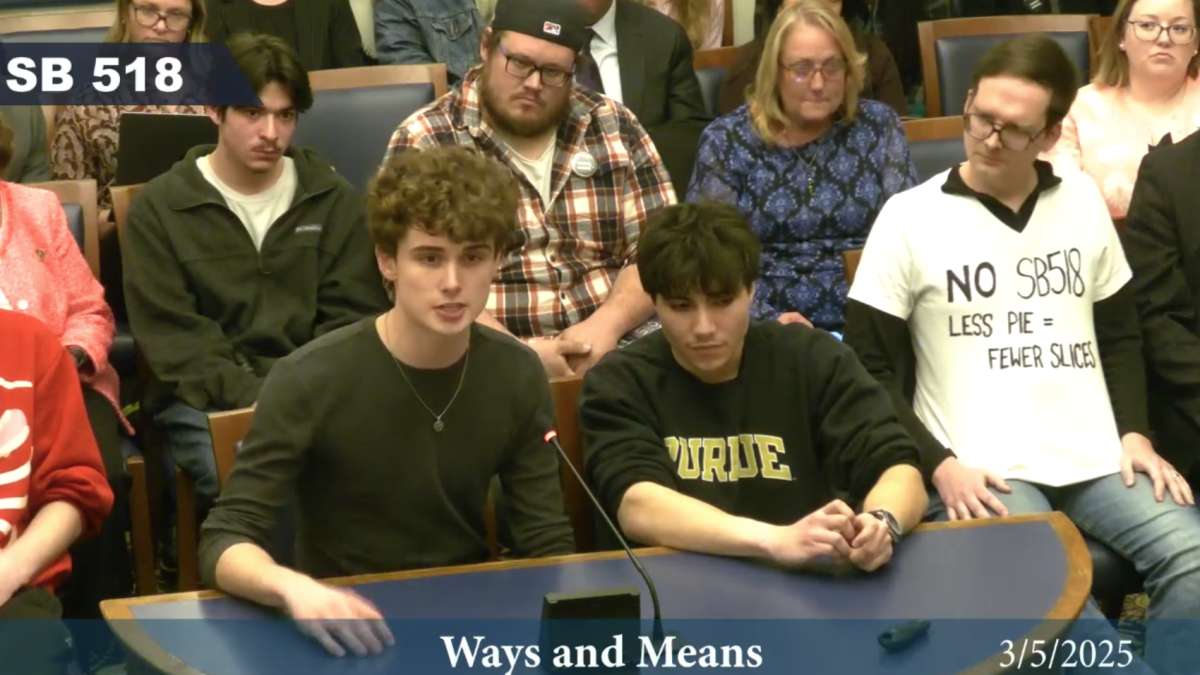
Keagan Williams
Senior Keagan Williams points to his acceptance to West Point as proof of IPS excellence.
He credits the district and Shortridge’s International Baccalaureate program. Now he feels a duty to protect both.
“I have an obligation and a duty to protect the IB program, to make sure it's sustained for all students,” Williams said.
That feeling of obligation catapulted him in front of a dozen lawmakers in March. Williams is concerned about potential school closures and subsequent changes to the IB program as a result of SB 518.
In his first testimony ever, Williams stated his support of the IB program and IPS, and he also challenged the narrative that his district is “failing.”
The 17-year-old told WFYI that’s a narrow perspective.
“Hypothetically, if we were failing, what about this bill is going to make us better,” Williams said. “Taking away resources? Are you going to give us less and expect us to do more?”
Like other students that testified, he said he was glad to see students from both sides energized to give their input and be involved.
“I just hope that we can reinvigorate this sense of pride in our government to bring forth diplomatic solutions to these kinds of issues and try to find common ground where we can,” Williams said.
Rachel Kinnaman
Rachel Kinnaman never attended IPS or a charter school. She graduated from a township public school and is a sophomore at Indiana University Indianapolis.
She first learned about SB 518 on social media, then began researching.
“I don't have a huge agenda against charter schools. Like, I'm not massively offended by them,” Kinnaman said. “The bill's not doing what it's supposed to do. It's supposed to make things fair, but it's not making things fair. It's just shifting it.”
Kinnaman’s years at Decatur High School showed her how students can make the most of high school services, like federal programs and dual credit options.
She started college with more than 24 credits and immediately jumped into her career path, accounting.
The 20-year-old told state lawmakers that she is worried about diverting property tax money to charter schools.
One Republican lawmaker asked how she knew about the controversial legislation. Kinnaman said it wasn’t a bad question, she was caught off guard though.
“I felt a little bit accused, but I didn't take it personally,” Kinnaman said. “I think she was just like, ‘I've never seen this many young people coming to testify for a bill.’ So I think it's actually a good thing that younger people are getting more involved.”
Zakariya ‘Zak’ Abdulbari
Zak Abdulbari said IPS helped him find his voice — now he’s using it to fight SB 518.
“This is a very beneficial place for a very diverse community,” Abdulbari said. “I do not want this to be touched.”
Abdulbari, 17, started Shortridge High School’s chapter of Young Democratic Socialists of America, which he said brings in students of all backgrounds.
“I've been particularly, particularly dedicated to not just using my voice, but to try to give spaces to other kids to use their voices,” Abdulbari said.
Abdulbari, whose father is Palestinian, said his activism grew from the Palestinian Youth Movement.
He said student turnout to testify was “beautiful,” though he hoped more IPS students would attend.
“There's a lot of kids who believe that standing up for what they believe is right is not even worth it, because they believe that they're incapable of making a change,” Abdulbari said. “That's because that notion has been pressed against students so much that we don't really necessarily matter.”
Abdulbari said his generation needs to fight and the roots of SB 518 are no different than even larger issues, like climate change, that they need to challenge because they involve power and money.
“The more and more you push against people who are trying to stand up for what's right, the more and more they will fight for what's right,” Abdulbari said.
Javarius Strayhorn
Javarius Strayhorn hopes to teach in the same charter schools that shaped his life.
“Our leadership is very hands-on with all of us,” Strayhorn said. “ I have that network, you know, so trying to go into that is easier … I feel like I'm already on the foundation. I just have to work to get there.”
Strayhorn is known as an advocate around his high school, Believe Circle City High School. He said Senate Bill 518 is important because charter schools are public schools — and they should be funded like his peers at traditional districts.
“Since we are a public school,” Strayhorn said. “I think that we all should be able to receive all of that.”
And inclusion matters there so school officials focus on social-emotional learning and education opportunities surrounding Black History Month and Hispanic History Month, among others.
“They make sure that we're all included,” Strayhorn said.
Strayhorn also gave testimony at an Indianapolis Public Schools board meeting in February. RISE Indy, a local education advocacy organization that supports IPS partnering with charter schools, started him off with what he could say and some suggestions.
“We were given a structure, but I did change a lot of what was on it because I wanted them to feel me, personally, rather than what was on it,” Strayhorn said.
Strayhorn believes there’s a lot of rumors about charter schools like that there’s no transparency or only wealthy families attend his school, and he disagrees, “wholeheartedly,” he said.
“When they see a line long enough, they start to believe it,” Strayhorn said. “That's where it falls into everybody saying one thing, but actually it's another.”
Contact WFYI Statehouse education reporter Rachel Fradette at rfradette@wfyi.org.
 DONATE
DONATE




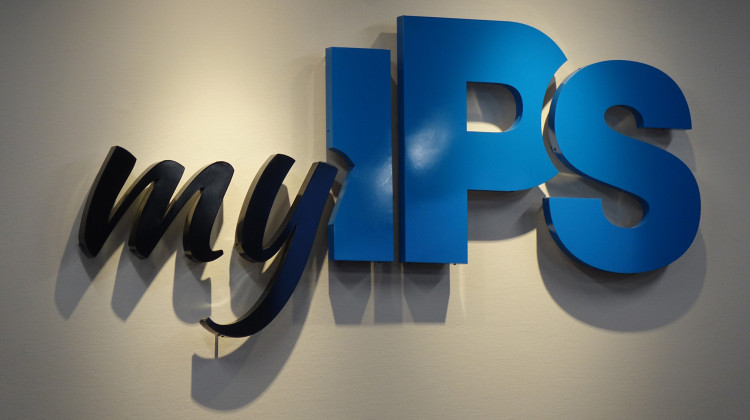
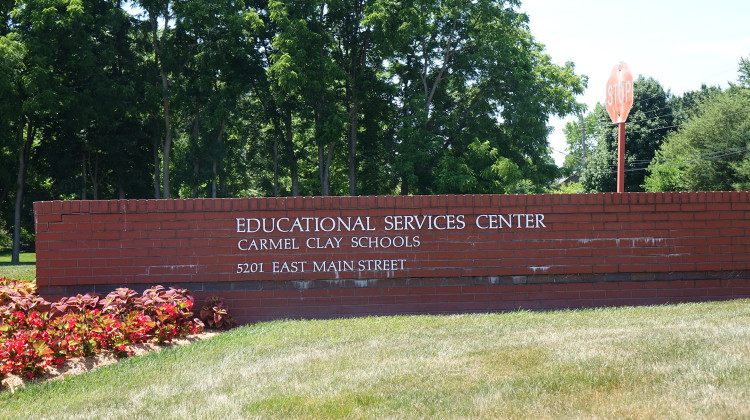


 Support WFYI. We can't do it without you.
Support WFYI. We can't do it without you.